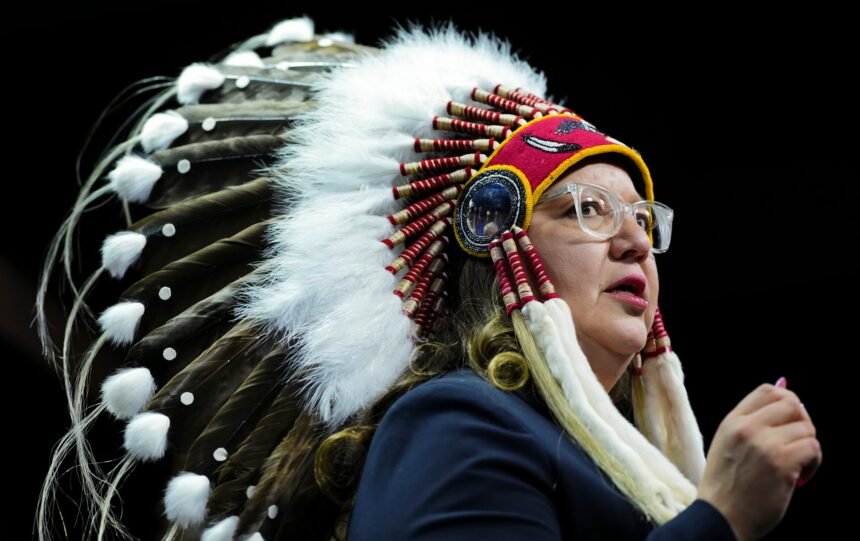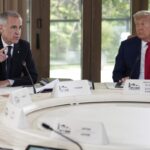Article – As Ottawa prepares to host next week’s highly anticipated Federal-Indigenous roundtable with newly appointed Finance Minister Mark Carney, Indigenous leaders across the country have been instructed to submit their questions in advance—a procedural move drawing mixed reactions from First Nations representatives.
The gathering, scheduled for July 18 at the Shaw Centre, marks Carney’s first major engagement with Indigenous leadership since taking office last month. According to documents obtained by LCN, the federal government has requested all participating chiefs to provide their questions by tomorrow’s deadline to “ensure productive dialogue and time management.”
Chief Melanie Gladstone of the Kanien’kehá:ka Nation called the pre-submission requirement “concerning but not surprising” during our conversation yesterday. “We’ve seen this playbook before. It gives the impression of consultation while allowing officials to craft careful responses rather than engage in genuine dialogue,” she explained while reviewing briefing materials at her office near Parliament Hill.
The meeting agenda, shared with attendees last week, focuses heavily on economic partnerships, resource development, and what the government terms “mutual prosperity frameworks.” Carney, whose appointment generated significant attention given his international finance background, has publicly committed to “reset relationships” with Indigenous communities.
A spokesperson from Indigenous Services Canada defended the question submission process as “standard practice for high-level ministerial meetings” and emphasized that “spontaneous discussion will still be welcomed.” However, they confirmed that pre-submitted questions would receive priority during the limited four-hour session.
For Chief William Constant of Fisher River Cree Nation, who will travel from Manitoba to attend, the format reflects ongoing frustrations. “They want our questions beforehand, but we still haven’t received detailed information about their new economic partnership models,” he told me during our phone conversation. “It’s difficult to formulate meaningful questions when we’re working with incomplete information.”
The meeting comes at a crucial moment. Statistics Canada recently reported that unemployment in Indigenous communities remains approximately 2.7 times higher than the national average, while infrastructure deficits on many reserves continue to worsen. Meanwhile, several major resource development projects valued at over $40 billion collectively await regulatory decisions that require meaningful Indigenous consultation.
Carney’s office released a statement yesterday indicating the finance minister “looks forward to hearing directly from Indigenous leaders about their economic priorities and challenges.” The statement added that this initial meeting would “lay groundwork for a new economic reconciliation framework” to be developed over the coming months.
Parliamentary Secretary for Indigenous Relations, MP Julie Desjardins, defended the format while speaking with reporters on Parliament Hill Tuesday. “Minister Carney is committed to respectful, productive dialogue. The advance questions help ensure we address the most pressing concerns within our limited timeframe,” she explained.
I visited the Shaw Centre yesterday, where staff were already preparing the Grand Ballroom for the high-profile meeting. Security measures are being enhanced, with additional RCMP personnel visible around the perimeter during my visit.
Not all Indigenous leaders view the format negatively. Grand Chief Martha Snowbird told me she appreciates the structured approach. “It forces both sides to come prepared. I’ve submitted questions about our community’s infrastructure funding gaps and expect clear answers,” she said during our meeting at her Ottawa hotel.
What remains unclear is how Carney’s economic vision differs from previous government approaches. His recent speeches have emphasized “inclusive growth” and “sustainable development,” but specific policy shifts haven’t yet been articulated.
For context, the last similar gathering in 2023 ended with mixed results. Several chiefs walked out in protest over what they described as “predetermined outcomes,” while others signed memorandums of understanding for economic development initiatives.
Ottawa’s downtown core will likely see increased activity next week, with several Indigenous organizations planning information sessions and cultural events alongside the official meeting. The Assembly of First Nations has announced a concurrent economic summit at the nearby Westin Hotel, creating what Chief Gladstone describes as “parallel conversations about our economic future.”
As preparations continue, one thing remains certain: the relationship between the federal government and Indigenous communities continues to evolve, with economic reconciliation increasingly taking center stage in the national conversation about Canada’s future.







